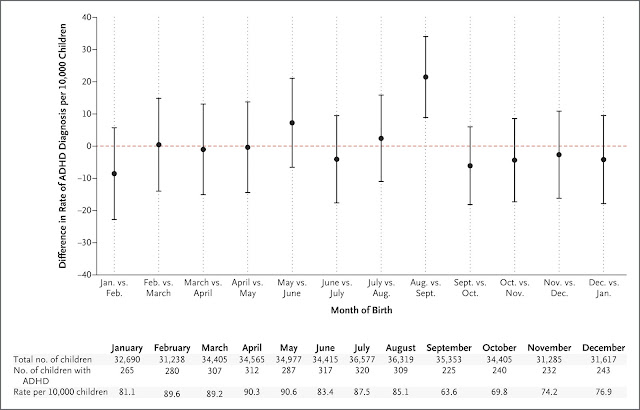Born in August - More Likely to Have ADHD
I was a senior in college when I was 19 years old. I was therefore young compared to most of my peers. Back in first grade when conduct was part of the report card, I should just say that my rating under the subject left a lot to be desired. This continued even in the later years of elementary school where my math grade approached 100% while my conduct grade was stranded at 78%, with 75% as the passing mark. At least, I passed. Imagining myself as a student in an elementary school here in the United States makes me wonder if I would actually be more likely referred to an evaluation for some condition such as attention deficit hyperactivity disorder (ADHD). Perhaps, I would. There is a study that just came out in the New England Journal of Medicine that goes through data on children in the US who were born in the period from 2007 through 2009 and were followed through December 2015. The paper's very interesting finding is that "rates of diagnosis and treatment of ADHD are higher among children born in August than among children born in September in states with a September 1 cutoff for kindergarten entry".
Here is the graph that shows how the birth month of August really stands out:
It is actually not August that is special. The number of ADHD cases for children born in August is really no different from those in the previous months of June and July. What makes August extraordinary are the much lower number of cases for children born in September, October, November, December.
In the United States, children start school in September so there is usually a cutoff date for requiring children to enter kindergarten. If a child is born before September 1, that child must enroll in kindergarten after his or her 5th birthday. Children born in the months of September, October and November are therefore often the oldest in their class while those born in August are often the youngest. Thus, it is possible to have almost a year difference in age between two kids in the same elementary class. As a child once and now as a parent, I know that a difference of one year in age can count a lot in terms of how a child behaves.
The study does not conclude that there is ADHD misdiagnosis. However, the fact that children born during the "ber" months are less likely to be diagnosed with ADHD raises this question.
Here is the graph that shows how the birth month of August really stands out:
 |
| Above copied from New England Journal of Medicine |
It is actually not August that is special. The number of ADHD cases for children born in August is really no different from those in the previous months of June and July. What makes August extraordinary are the much lower number of cases for children born in September, October, November, December.
In the United States, children start school in September so there is usually a cutoff date for requiring children to enter kindergarten. If a child is born before September 1, that child must enroll in kindergarten after his or her 5th birthday. Children born in the months of September, October and November are therefore often the oldest in their class while those born in August are often the youngest. Thus, it is possible to have almost a year difference in age between two kids in the same elementary class. As a child once and now as a parent, I know that a difference of one year in age can count a lot in terms of how a child behaves.
The study does not conclude that there is ADHD misdiagnosis. However, the fact that children born during the "ber" months are less likely to be diagnosed with ADHD raises this question.
Comments
Post a Comment